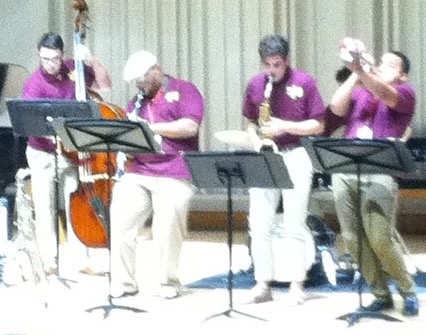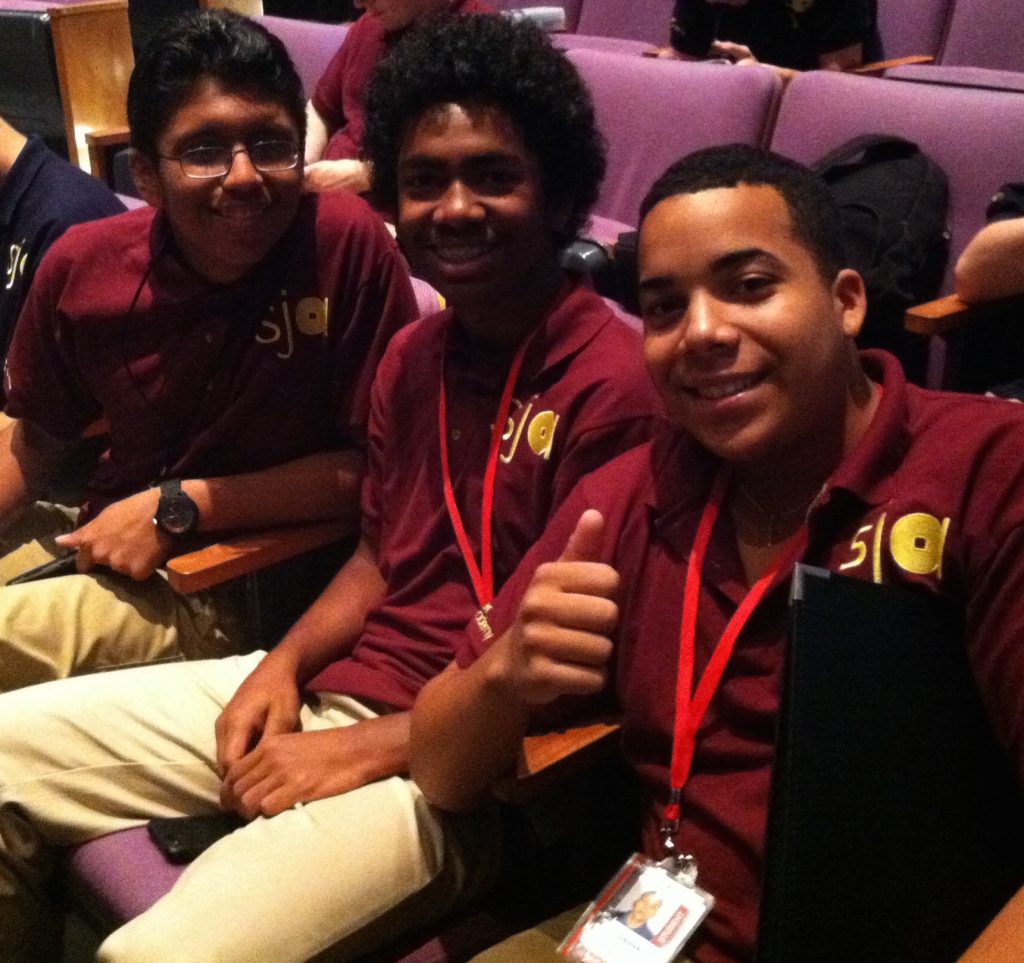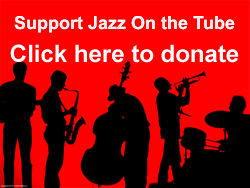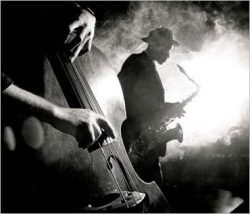
Right to left: Jesús Ricardo (trumpet) with Hector Gagnet and Craig Jackson (both from Dayton, Ohio) and Philip Norris on bass (Wake Forest, NC.)
Will jazz survive?
The answer to this question, which lives in the hearts of all serious jazz fans, depends on two things:
Will the new generations embrace the music?
Will the established generations give the younger guys and gals a hand up?
Here’s the story of one young man’s path
Jesús Ricardo grew up in the Vedado district of Havana, Cuba.
He got his first exposure to music education when his fourth grade teacher suggested to his father that Jesús abundant energy, then used to beat rhythms on his school desk and other surfaces, might be more constructively channeled in a music program for kids. His father, a non-musician, said: “Sure, let’s give it a try.”
The focus of the training was classical, as is all institutional music education in Cuba, but the school also had as an elective a jazz big band. Hearing the band opened Jesús ears and captured his imagination. In jazz, he heard a music that would allow him not just to play, but to also express himself.
Bringing the US jazz tradition to Cuba
When he was in seventh grade, Jazz at Lincoln Center and Horns to Havana brought instructors to the island for performances and workshops. Jesús was one of the students who received training from Wynton Marsalis, Victor Goines, and Mike Rodriguez.
Students in the program were invited to sing solos and Jesús stood up and gave it a try. He along with the other students were encouraged to get that same singing feel with their instruments. When the Jazz at Lincoln Center group performed at Havana’s Teatro Nacional, Jesus was invited to come on stage and take a trumpet solo on Night in Tunisia.
In the ninth grade, Horns to Havana arranged for Jesús to spend a month in New Orleans.
Last year with help from Horns to Havana, he attended the Stanford Jazz Workshop and this summer he qualified for Jazz at Lincoln Center’s Summer Jazz Academy.
Jazz at Lincoln Center’s Summer Jazz Academy
Designed by Wynton Marsalis, who is also one of the instructors, and led by Dr. Michael Albaugh, the Academy is a two week residential program which this year was held on the campus of Bard College.
This year’s faculty included Wynton Marsalis (trumpet), Marcus Printup (trumpet), Ted Nash (saxophone, flute), Vincent Gardner (trombone), Helen Sung (piano), James Chirillo (guitar), Rodney Whitaker (bass) and Ali Jackson (drums).
(If any of these names are unfamiliar to you, get thee to Youtube, Spotify and/or the iTunes store and dig in. You won’t be disappointed. The faculty played a set as an octet and individually and as a group they were splendid.)
The program is open by audition to high school jazz students from all over the world. Only only 42 are accepted.
In addition to his growing jazz chops, Jesús is at home in Cuban idioms like Son, Guaracha and Rumba and draws inspiration from the music of Cuban trumpet greats like Chapotin and Florecita. He’s performed with the Septeto Habanero, an esteemed interpreter of the island’s classic Son repertoire.
A serious student of the tradition
When I asked Jesús who his favorite trumpet player was, he responded: “All of them. There’s something important to learn from all of them.”
As part of their training, the students worked in small groups – eight different octets in total – and at the end of Week One they offered a public performance of standards ranging from George and Ira Gershwin to Ornette Coleman.
The octet Jesús played with was tasked with King Oliver’s “Dippermouth Blues.” At first he says he worked the changes like a bebopper until Marsalis, who coached the unit, explained Oliver’s syncopated style which had been perfected by countless parades and funerals.
With Marsalis’ guidance, Jesús adapted and you could hear – and even see – the New Orleans flowing through him as he marched in place when he took his solo.
Will jazz survive?
At the start of this article I said that the answer to this question depends on two things: the younger generation’s interest and the established generation’s caring.
Things seem to be on the right track in both these departments.
If you want to learn more about groups that are helping make the next generation of jazz possible, here are two excellent places to start.
Horns to Havana
Jazz at Lincoln Center

Jesús (right) with fellow students at the Lincoln Center Summer Jazz Academy
– Ken McCarthy
Jazz on the Tube
P.S. Our unique programming is made possible by help from people like you. Learn how you can contribute to our efforts here: Support Jazz on the Tube
Thanks.





